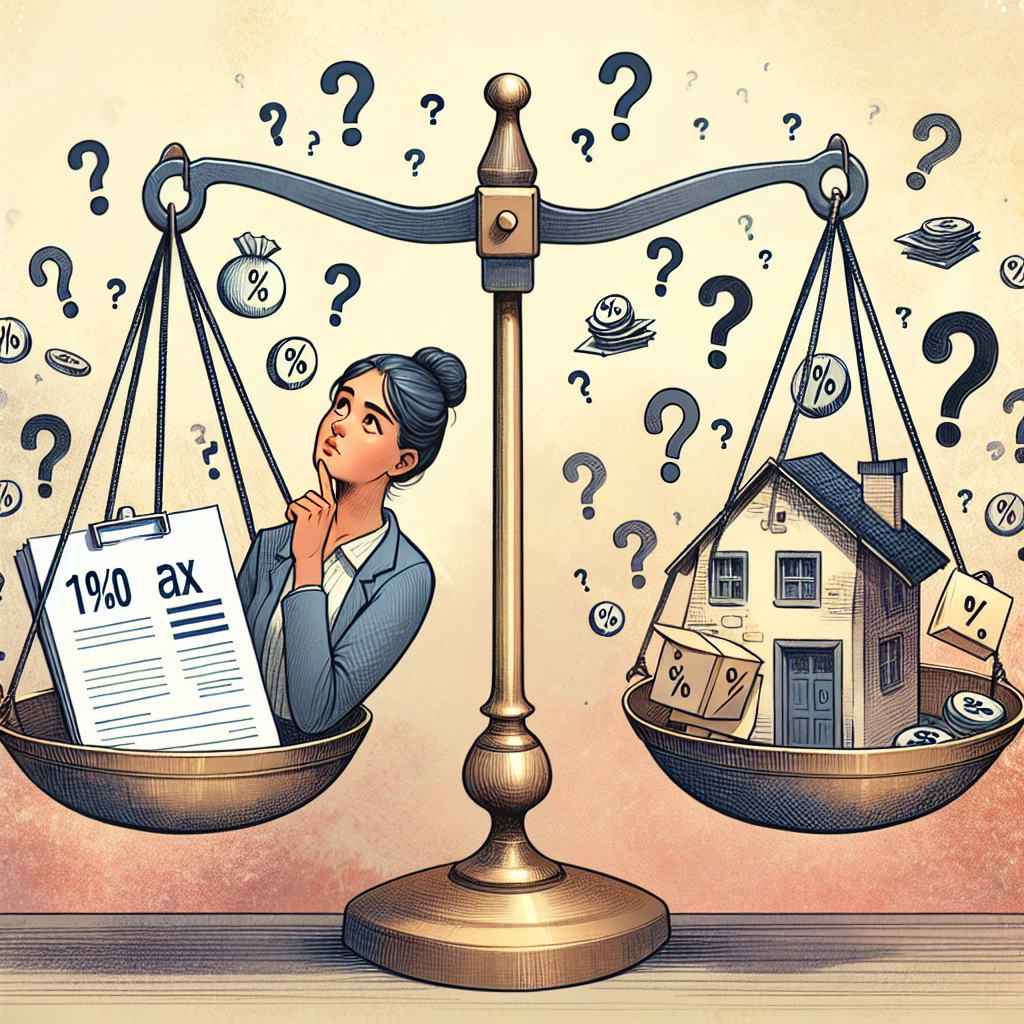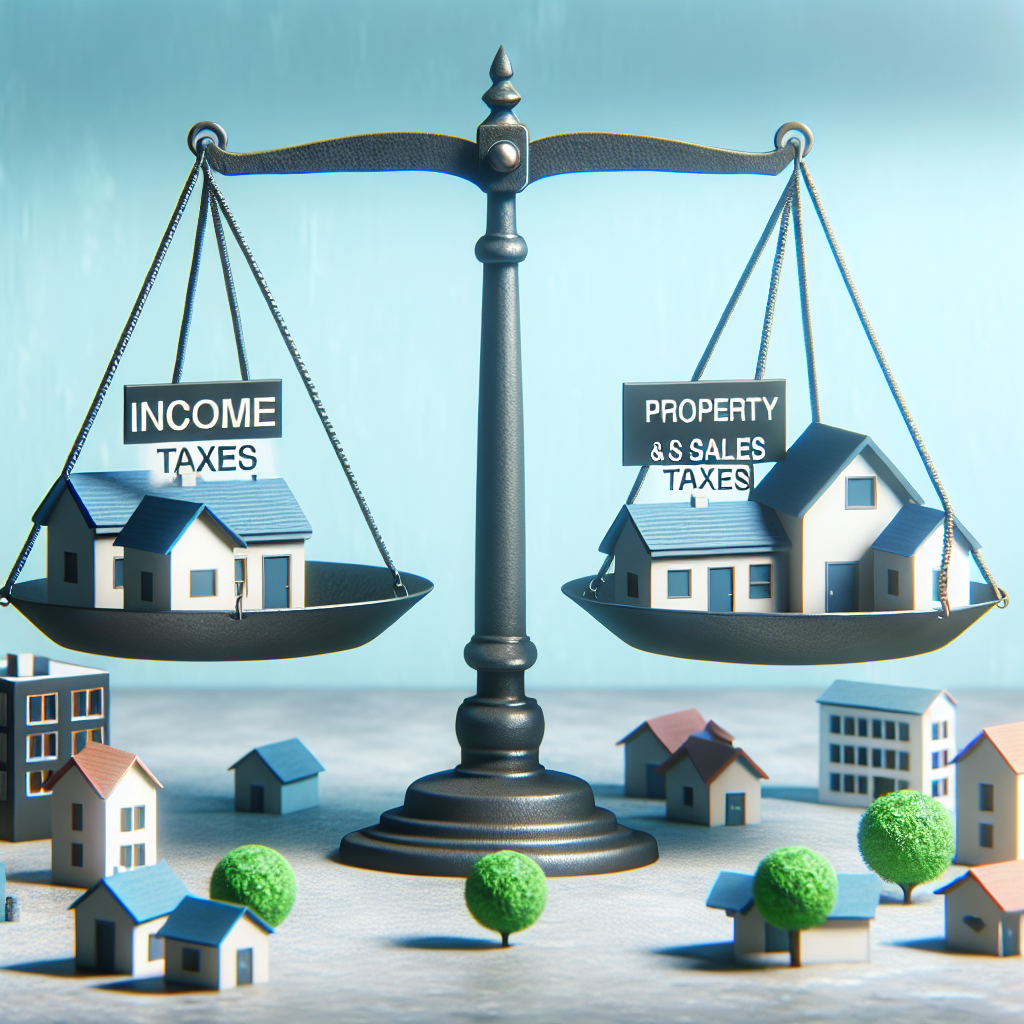-
Table of Contents
- Could Real Estate Investing Survive a Shift from Income Taxes to Property and Sales Taxes?
- The Current Taxation Landscape
- Potential Benefits of Shifting to Property and Sales Taxes
- 1. Simplification of Tax Code
- 2. Encouragement of Investment
- 3. Stability of Revenue
- Challenges and Concerns
- 1. Regressivity of Sales Taxes
- 2. Impact on Housing Affordability
- 3. Potential for Market Distortion
- Case Studies and Examples
- Case Study: Texas
- Example: European VAT Systems
- Statistical Analysis
- Property Tax Revenue
- Sales Tax Revenue
- Income Tax Revenue
- Feasibility and Future Outlook
- Political Considerations
- Economic Conditions
- Public Opinion
- Conclusion
Could Real Estate Investing Survive a Shift from Income Taxes to Property and Sales Taxes?

Real estate investing has long been a cornerstone of wealth-building strategies for individuals and institutions alike. However, the landscape of taxation is ever-evolving, and one of the most significant potential changes on the horizon is a shift from income taxes to property and sales taxes. This article explores the implications of such a shift on real estate investing, examining the potential benefits, challenges, and overall feasibility of this transition.
The Current Taxation Landscape
In most countries, the primary sources of government revenue are income taxes, property taxes, and sales taxes. Each of these has its own set of advantages and disadvantages, and they impact different sectors of the economy in various ways.
- Income Taxes: These are levied on individual and corporate earnings. They are progressive in nature, meaning higher earners pay a larger percentage of their income in taxes.
- Property Taxes: These are based on the value of owned real estate. They are typically used to fund local services such as schools, police, and infrastructure.
- Sales Taxes: These are applied to the sale of goods and services. They are considered regressive because they take a larger percentage of income from lower earners.
Potential Benefits of Shifting to Property and Sales Taxes
Shifting from income taxes to property and sales taxes could offer several potential benefits, particularly for real estate investors.
1. Simplification of Tax Code
The current tax code is notoriously complex, with numerous deductions, credits, and loopholes. A shift to property and sales taxes could simplify the tax system, making it easier for investors to understand their tax liabilities and plan accordingly.
2. Encouragement of Investment
Income taxes can discourage investment by reducing the after-tax return on investment. By shifting to property and sales taxes, the government could potentially encourage more investment in real estate and other sectors, as investors would retain a larger portion of their earnings.
3. Stability of Revenue
Property taxes provide a stable source of revenue for local governments, as property values tend to be less volatile than income levels. This stability could be beneficial for funding essential services and infrastructure projects.
Challenges and Concerns
While there are potential benefits to shifting from income taxes to property and sales taxes, there are also significant challenges and concerns that must be addressed.
1. Regressivity of Sales Taxes
Sales taxes are inherently regressive, meaning they disproportionately impact lower-income individuals. This could exacerbate income inequality and place a heavier burden on those least able to afford it.
2. Impact on Housing Affordability
Increasing property taxes could make housing less affordable, particularly for low- and middle-income families. This could lead to higher rates of homelessness and housing instability, which would have broader social and economic implications.
3. Potential for Market Distortion
Shifting to property and sales taxes could distort the real estate market by incentivizing certain types of investments over others. For example, investors might focus more on commercial properties, which can generate higher sales tax revenue, rather than residential properties.
Case Studies and Examples
To better understand the potential impact of shifting from income taxes to property and sales taxes, it is helpful to examine case studies and examples from regions that have implemented similar changes.
Case Study: Texas
Texas is one of the few states in the U.S. that does not have a state income tax. Instead, it relies heavily on property and sales taxes to fund government services. This has had several notable effects on the real estate market:
- High Property Taxes: Texas has some of the highest property tax rates in the country, which can make homeownership more expensive.
- Economic Growth: Despite high property taxes, Texas has experienced significant economic growth, partly due to its business-friendly environment and lack of state income tax.
- Housing Affordability: The high property taxes have contributed to rising housing costs, particularly in urban areas like Austin and Dallas.
Example: European VAT Systems
Many European countries rely heavily on value-added taxes (VAT) as a source of revenue. While not identical to sales taxes, VATs share some similarities and can provide insights into the potential impact of shifting away from income taxes:
- Revenue Stability: VATs provide a stable source of revenue, which can be beneficial for funding public services.
- Regressivity: Like sales taxes, VATs are regressive and can disproportionately impact lower-income individuals.
- Economic Impact: The reliance on VATs has not hindered economic growth in many European countries, suggesting that a shift away from income taxes could be feasible.
Statistical Analysis
To further explore the potential impact of shifting from income taxes to property and sales taxes, it is useful to examine relevant statistics and data.
Property Tax Revenue
According to the U.S. Census Bureau, property taxes accounted for approximately 31% of total state and local government revenue in 2019. This highlights the significant role that property taxes already play in funding government services.
Sales Tax Revenue
Sales taxes accounted for approximately 23% of total state and local government revenue in 2019. This indicates that sales taxes are also a major source of revenue, but they are less significant than property taxes.
Income Tax Revenue
Income taxes accounted for approximately 37% of total state and local government revenue in 2019. This underscores the importance of income taxes as a revenue source and the potential challenges of shifting away from them.
Feasibility and Future Outlook
The feasibility of shifting from income taxes to property and sales taxes depends on a variety of factors, including political will, economic conditions, and public opinion. While there are potential benefits to such a shift, there are also significant challenges that must be addressed.
Political Considerations
Any major change to the tax system would require significant political support. Policymakers would need to carefully consider the potential impact on different segments of the population and work to mitigate any negative effects.
Economic Conditions
The economic conditions at the time of the shift would also play a crucial role in determining its feasibility. For example, during periods of economic growth, it may be easier to implement such changes without causing significant disruption.
Public Opinion
Public opinion would be a critical factor in determining the success of any shift from income taxes to property and sales taxes. Policymakers would need to engage with the public and build support for the changes, addressing any concerns and highlighting the potential benefits.
Conclusion
In conclusion, shifting from income taxes to property and sales taxes could have significant implications for real estate investing. While there are potential benefits, such as simplification of the tax code and encouragement of investment, there are also significant challenges, including the regressivity of sales taxes and the potential impact on housing affordability. By examining case studies, statistical data, and potential future scenarios, it is clear that any such shift would require careful consideration and planning. Ultimately, the feasibility of this transition would depend on a variety of factors, including political will, economic conditions, and public opinion. As the landscape of taxation continues to evolve, it will be essential for real estate investors to stay informed and adapt to any changes that may arise.








